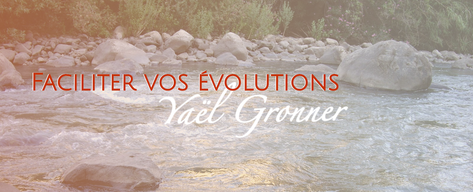IN WHAT WAY DO I FACILITATE ? As a coach, trainer, researcher and facilitator, I contribute to the evolution of collaborative methods to improve human relations, thus permitting productive and lasting interactions.
HOW DO I FACILITATE ? From open forums with 200 participants to individual coaching sessions, alone and as part of a team, I activate spaces in which collaborative sharing enriches each participant.
WHY TRANSMIT ? As a university teacher grounded in practical field experience, I deeply believe in the quality of this approach in facilitating authentic and fruitful encounters among participants coming from diverse cultures and sensitivities.
About me
For the past 10 years, I have been assisting small and medium-sized businesses, large corporations, associations and local authorities in building effective and lasting collaborative partnerships. I am deeply convinced of the benefits of participative work that combines individual commitment and group dynamics.


With a doctorate in sociology (EHESS Paris) and as a university teacher, I subject the challenges facing our society to a rigorous intellectual approach. Sensitive to both social and societal aspects, and wishing to contribute to the development of the Provence-Alpes-Côte-Azur region of France where I live, I am involved in several innovative, economic and collaborative activities and projects.
Both multicultural and trilingual, I am able to adapt to different environments, attentive to explicit and implicit needs, seeking the right balance between "proposing ideas" and "letting what is already there emerge". My career, replete with international collaborations, has taught me how to facilitate authentic encounters between people from different backgrounds.

Involved in various professional networks, co-founder and member of the Visions Collectives Association, I work towards creating meeting spaces between facilitators/coaches and fostering collective intelligence among peers.
Whether face-to-face or through distance learning, trust and fellowship are precious points of focus for me, serving as the bond between my proposals.

SUPPORT FROM LOCAL TO EUROPEAN LEVEL
# 10 years
Since 2013, I have been supporting organizations (the business sector, associations, public authorities, etc.) and individual professionals (executives, managers, entrepreneurs, etc.).
# 2500 participants
Around 2,500 participants have taken part in the collective intelligence activities that I have led or co-led.

Acting together is the key to lasting progress in Collective Intelligence. There are various approaches, some simple and quick, others complex, requiring adaptation to demanding environments.
By customizing these approaches, tailor-made solutions can be implemented. With simplicity, enjoyment, and the involvement of stakeholders, we go beyond individual capacities to co-create innovative solutions.
- Open Space Technology (30 to 2000 participants) enable dynamic and productive meetings, mobilizing networks and generating new ideas.
- The World Café (10 to 200 participants) facilitates collaborative dialogues.
- Professional co-development (5 to 12 participants) promotes mutual learning and collective intelligence, adaptable to various contexts.

Teams may seek external assistance to enhance group work quality, create shared meaning, boost engagement, or maintain regular check-ins for collective well-being, providing a learning space to reflect on collaborative methods.
Three main types of team support include coaching, supervision, and a multi-cultural approach.
- Team coaching involves limited-time support with specific goals and action plans.
- Supervision fosters the evolution of practices and professional identity, creating a lasting dynamic for team cohesion.
- Facilitation in a multi-cultural context addresses the challenges of working in diverse environments, promoting a rewarding human and professional experience. It encourages individuals to consider various perspectives and develop greater relational agility, emphasizing authentic dialogue for transcending differences and fostering peace.

Continuous learning is essential in adapting to a constantly changing world. Training in the practices, odes of behavior and tools of Collective Intelligence stimulates a dynamic of ongoing improvement in know-how and interpersonal skills. These sessions, led by Yael Gronner, integrate theoretical knowledge, practical exercises, and hands-on experience which, by being systematically adjusted to individual needs and specific situations, can afterwards be effectively applied to the participants' professional work environment.
- The Professional Co-Development (CODEV) Training offers a collaborative learning approach for individuals seeking to enhance their practices by learning from one another. The program, consisting of two sessions, each spanning two days, including individual supervision, focuses on creating a collaborative dynamic that fosters co-learning initiatives.
- The Collective Intelligence Facilitation Training aims to improve participants' ability to foster collective intelligence in their work environment, emphasizing collaboration, team mobilization, and creating a supportive space in which individual talent can emerge. This three-session program, with inter-session support, provides concrete tools applicable to specific professional settings.
- The Working in a Multi-Cultural Environment Training addresses the specific skills needed for collaboration between diverse cultures, spanning three sessions including individual supervision. Participants learn to understand challenges, adapt behaviors, and foster equity, diversity, and inclusion, enhancing their ability to engage in or lead multi-cultural teams.

In order to be able to respond to complex situations, demanding more than mere business skills, a growing number of companies are beginning to realise that other relational or behavioral skills are required. Individual coaching is the ideal tool for developing such skills.
These comprise agility in working with different teams, teamwork, and stress management to encourage risk-taking, skills that not only enhance employee efficiency but also foster personal growth.
Individual coaching objectives may include assertiveness training, improving communication with co-team members, developing managerial skills, time management, achieving meaningful professional goals, public speaking and developing one's role in the team.



















































